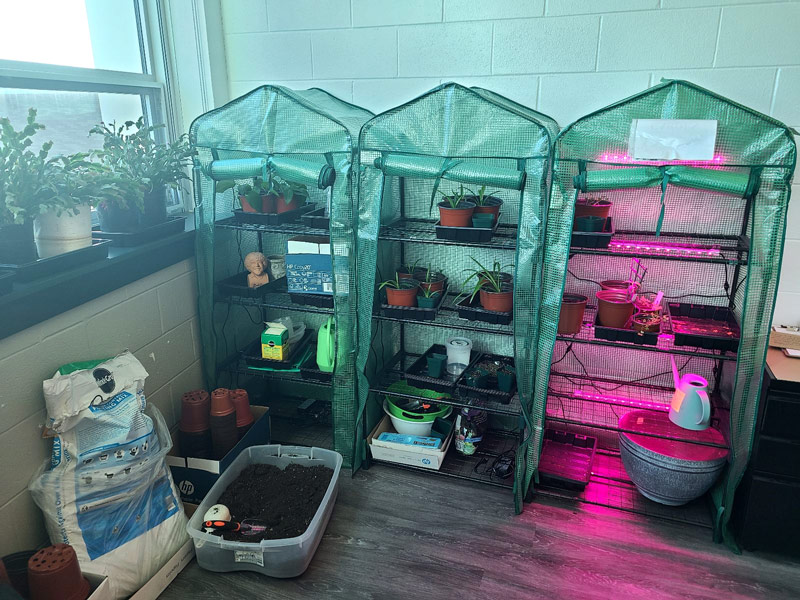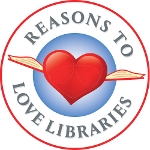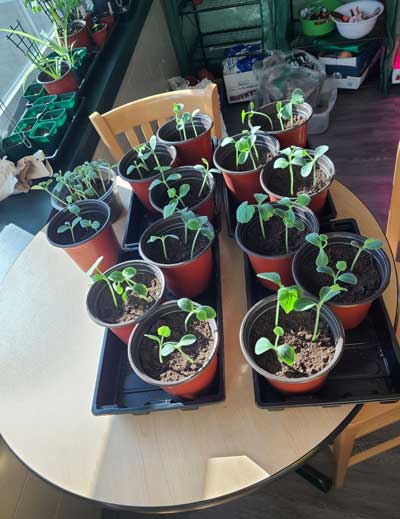Librarian Brings Greenhouse, Sustainable Practices to School | Reasons to Love Libraries
En route to earning her Sustainable Library Initiative school librarian certification, Ashley Grillo put a greenhouse in her library at Spackenkill (NY) High School and taught students about gardening, composting, and recycling, among other things.
 |
Ashley Grillo's library greenhouse.Photos courtesy of Ashley Grillo |
 Ashley Grillo was in her third year as a librarian at Spackenkill (NY) High School and looking for a way to make her mark on the school and establish herself in her career.
Ashley Grillo was in her third year as a librarian at Spackenkill (NY) High School and looking for a way to make her mark on the school and establish herself in her career.
“I was really looking to reach out and figure out, ‘How can I be the best librarian and solidify my career?’” she says.
About that same time, the Dutchess County Board of Cooperative Educational Services offered to waive the fee for her to pursue the Sustainable Library Initiative’s (SLI) school librarian certification. SLI is a membership program designed to help libraries and their communities reach three goals of sustainability: environmental stewardship, social equity, and economic feasibility. The librarian certification program allows individuals to create programs and develop ways to align their library with SLI’s goals.
“When I first heard about the Sustainable Library Initiative, I really thought it was going to be about environmental sustainability, which has always been something that’s interested me," says Grillo. "So I was like, ‘Oh, great, I can evaluate my library and how we’re doing as far as environmental sustainability.’ But when I joined the program [I thought], ‘No this is really to evaluate your entire program start to finish.'”
SLI’s holistic approach engages school librarians in five benchmark categories: partnerships & Community Involvement; Leading Beyond the Library; Social Equity & Resiliency; Standards & Curriculum; and Collections. The program typically takes a year to complete. Separate certifications are available to public and academic librarians as well.
To begin, Grillo secured a grant and implemented an indoor greenhouse where students could grow their own food. She began an after-school program to teach students the basics of gardening.
 “The kids were just so thrilled,” Grillo says.
“The kids were just so thrilled,” Grillo says.
She taught students about propagation, showed them how to make composting piles, and encouraged them to recycle water collected from rainstorms. The garden became a hub for students to create sustainable habits and track their plants’ progress. By teaching the students sustainable practices firsthand, they learned to make their own lives more environmentally friendly.
Students not only enjoyed planting but came to the library during the school day to check on growth, often taking advantage of other library services while there. But the kids weren’t the only ones finding inspiration in the greenhouse. Art classes used the plants as creative inspiration, and the science department has expressed an interest in collaborating on composting. Capitalizing on the interest in the building, Grillo set up book displays on cooking, gardening, and recycling. She also gave out seed starter kits.
At the end of the year, students could either take their plants home or donate them to a local community garden organized by a middle school teacher in the district.
When she earned her certification, she became only the 10th school librarian to receive it. Right now, the program is only offered to librarians in New York, but the organization says it is building capacity to offer the program in other states. Certified librarians become mentors for new participants.
With monthly meetings covering new environmental topics and member events, SLI encourages its members to continue growing and adapting to changes in their community and the world at large.
In the coming school year, Grillo plans to start an herb garden for students who enjoy cooking to learn to work with new ingredients. She also recently received her certification to be a yoga instructor and will start an after-school yoga program.
Grillo credits SLI with helping her expand her library’s offerings, broaden her abilities, and create relationships with colleagues and members of the community.
“The program encourages you to reach out to individuals in your community and in the building to make connections with people,” she says.
Even as the program focuses on sustainability, SLI covers all aspects of the library and how to make the space and programming a well-oiled machine with community at the helm.
“It’s not just about environmental sustainability,” she says. “It’s about the big picture.”
Caroline Nieto is a sophomore at Columbia University majoring in English.
RELATED
The job outlook in 2030: Librarians will be in demand
The job outlook in 2030: Librarians will be in demand
ALREADY A SUBSCRIBER? LOG IN
We are currently offering this content for free. Sign up now to activate your personal profile, where you can save articles for future viewing






Add Comment :-
Be the first reader to comment.
Comment Policy:
Comment should not be empty !!!